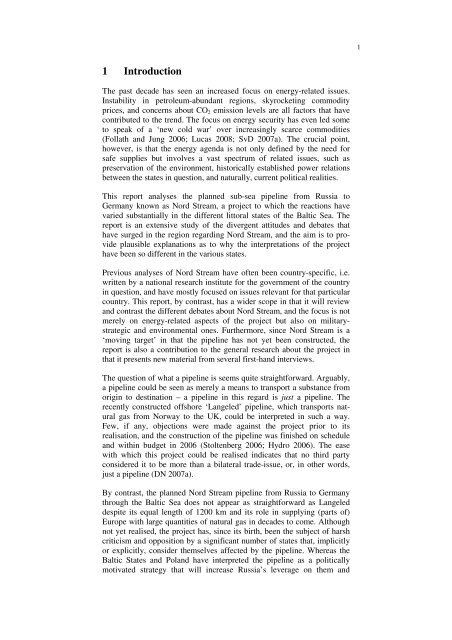Nord Stream: Not Just a Pipeline
Nord Stream: Not Just a Pipeline
Nord Stream: Not Just a Pipeline
Create successful ePaper yourself
Turn your PDF publications into a flip-book with our unique Google optimized e-Paper software.
1 Introduction<br />
The past decade has seen an increased focus on energy-related issues.<br />
Instability in petroleum-abundant regions, skyrocketing commodity<br />
prices, and concerns about CO2 emission levels are all factors that have<br />
contributed to the trend. The focus on energy security has even led some<br />
to speak of a ‘new cold war’ over increasingly scarce commodities<br />
(Follath and Jung 2006; Lucas 2008; SvD 2007a). The crucial point,<br />
however, is that the energy agenda is not only defined by the need for<br />
safe supplies but involves a vast spectrum of related issues, such as<br />
preservation of the environment, historically established power relations<br />
between the states in question, and naturally, current political realities.<br />
This report analyses the planned sub-sea pipeline from Russia to<br />
Germany known as <strong>Nord</strong> <strong>Stream</strong>, a project to which the reactions have<br />
varied substantially in the different littoral states of the Baltic Sea. The<br />
report is an extensive study of the divergent attitudes and debates that<br />
have surged in the region regarding <strong>Nord</strong> <strong>Stream</strong>, and the aim is to provide<br />
plausible explanations as to why the interpretations of the project<br />
have been so different in the various states.<br />
Previous analyses of <strong>Nord</strong> <strong>Stream</strong> have often been country-specific, i.e.<br />
written by a national research institute for the government of the country<br />
in question, and have mostly focused on issues relevant for that particular<br />
country. This report, by contrast, has a wider scope in that it will review<br />
and contrast the different debates about <strong>Nord</strong> <strong>Stream</strong>, and the focus is not<br />
merely on energy-related aspects of the project but also on militarystrategic<br />
and environmental ones. Furthermore, since <strong>Nord</strong> <strong>Stream</strong> is a<br />
‘moving target’ in that the pipeline has not yet been constructed, the<br />
report is also a contribution to the general research about the project in<br />
that it presents new material from several first-hand interviews.<br />
The question of what a pipeline is seems quite straightforward. Arguably,<br />
a pipeline could be seen as merely a means to transport a substance from<br />
origin to destination – a pipeline in this regard is just a pipeline. The<br />
recently constructed offshore ‘Langeled’ pipeline, which transports natural<br />
gas from Norway to the UK, could be interpreted in such a way.<br />
Few, if any, objections were made against the project prior to its<br />
realisation, and the construction of the pipeline was finished on schedule<br />
and within budget in 2006 (Stoltenberg 2006; Hydro 2006). The ease<br />
with which this project could be realised indicates that no third party<br />
considered it to be more than a bilateral trade-issue, or, in other words,<br />
just a pipeline (DN 2007a).<br />
By contrast, the planned <strong>Nord</strong> <strong>Stream</strong> pipeline from Russia to Germany<br />
through the Baltic Sea does not appear as straightforward as Langeled<br />
despite its equal length of 1200 km and its role in supplying (parts of)<br />
Europe with large quantities of natural gas in decades to come. Although<br />
not yet realised, the project has, since its birth, been the subject of harsh<br />
criticism and opposition by a significant number of states that, implicitly<br />
or explicitly, consider themselves affected by the pipeline. Whereas the<br />
Baltic States and Poland have interpreted the pipeline as a politically<br />
motivated strategy that will increase Russia’s leverage on them and<br />
1













